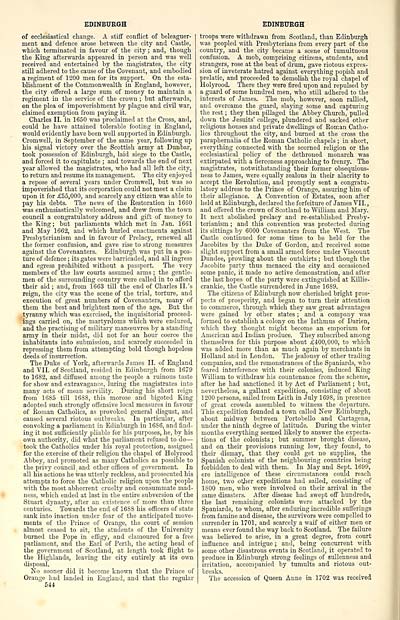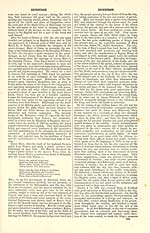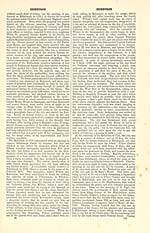Ordnance gazetteer of Scotland > Volume 2
(292) Page 544
Download files
Complete book:
Individual page:
Thumbnail gallery: Grid view | List view

EDINBURGH
of ecclesiastical change. A stiff conflict of beleaguer -
ment and defence arose between the city and Castle,
which terminated in favour of the city ; and, though
the King afterwards appeared in person and was well
received and entertained by the magistrates, the city
still adhered to the cause of the Covenant, and embodied
a regiment of 1200 men for its support. On the esta-
blishment of the Commonwealth in England, however,
the city offered a large sum of money to maintain a
regiment in the service of the crown ; but afterwards,
on the plea of impoverishment by plague and civil war,
claimed exemption from paying it.
Charles II. in 1650 was proclaimed at the Cross, and,
could he have attained tolerable footing in England,
would evidently have been well supported in Edinburgh.
Cromwell, in September of the same year, following up
his signal victory over the Scottish army at Dunbar,
took possession of Edinburgh, laid siege to the Castle,
and forced it to capitulate ; and towards the end of next
year allowed the magistrates, who had all left the city,
to return and resume its management. The city enjoyed
a repose of several years under Cromwell, but was so
impoverished that its corporation could not meet a claim
upon it for £55,000, and scarcely any citizen was able to
pay his debts. The news of the Restoration in 1660
was enthusiastically welcomed, and drew from the town
council a congratulatory address and gift of money to
the King ; but parliaments which met in Jan. 1661
and May 1662, and which hurled enactments against
Presbyterianism and in favour of Prelacy, renewed all
the former confusion, and gave rise to strong measures
against the Covenanters. Edinburgh was put in a pos-
ture of defence ; its gates were barricaded, and all ingress
and egress prohibited without a passport. The very
members of the law courts assumed arms ; the gentle-
men of the surrounding country were called in to afford
their aid ; and, from 1663 till the end of Charles II. 's
reign, the city was the scene of the trial, torture, and
execution of great numbers of Covenanters, many of
them the best and brightest men of the age. But the
tyranny which was exercised, the inquisitorial proceed-
ings carried on, the martyrdoms which were endured,
and the practising of military manoeuvres by a standing
army in their midst, did not for an hour coerce the
inhabitants into submission, and scarcely succeeded in
repressing them from attempting bold though hopeless
deeds of insurrection.
The Duke of York, afterwards James II. of England
and VII. of Scotland, resided in Edinburgh from 1679
to 1682, and diffused among the people a ruinous taste
for show and extravagance, luring the magistrates into
many acts of mean servility. During his short reign
from 1685 till 1688, this morose and bigoted King
adopted such strongly offensive local measures in favour
of Roman Catholics, as provoked general disgust, and
caused several riotous outbreaks. In particular, after
convoking a parliament in Edinburgh in 16S6, and find-
ing it not sufficiently pliable for his purposes, he, by his
own authority, did what the parliament refused to do —
took the Catholics under his royal protection, assigned
for the exercise of their religion the chapel of Holyrood
Abbey, and promoted as many Catholics as possible to
the privy council and other offices of government. In
all his actions he was utterly reckless, and prosecuted his
attempts to force the Catholic religion upon the people
with the most abhorrent cruelty and consummate mad-
ness, which ended at last in the entire subversion of the
Stuart dynasty, after an existence of more than three
centuries. Towards the end of 16SS his officers of state
sank into inaction under fear of the anticipated move-
ments of the Prince of Orange, the court of session
almost ceased to sit, the students of the University
burned the Pope in effigy, and clamoured for a free
parliament, and the Earl of Perth, the acting head of
the government of Scotland, at length took flight to
the Highlands, leaving the city entirely at its own
disposal.
No sooner did it become known that the Prince of
Orange had landed in England, and that the regular
5ii
EDINBURGH
troops were withdrawn from Scotland, than Edinburgh
was peopled with Presb}'terians from every part of the
country, and the city became a scene of tumultuous
confusion. A mob, comprising citizens, students, and
strangers, rose at the beat of drum, gave riotous expres-
sion of inveterate hatred against everything popish and
prelatic, and proceeded to demolish the royal chapel of
Holyrood. There they were fired upon and repulsed by
a guard of some hundred men, who still adhered to the
interests of James. The mob, however, soon rallied,
and overcame the guard, slaying some and capturing
the rest ; they then pillaged the Abbey Church, pulled
down the Jesuits' college, plundered and sacked other
religious houses and private dwellings of Roman Catho-
lics throughout the city, and burned at the cross the
paraphernalia of the Roman Catholic chapels ; in short,
everything connected with the scorned religion or the
ecclesiastical policy of the dethroned monarch was
extirpated with a fierceness approaching to frenzy. The
magistrates, notwithstanding their former obsequious-
ness to James, were equally zealous in their alacrity to
accept the Revolution, and promptly sent a congratu-
latory address to the Prince of Orange, assuring him of
their allegiance. A Convention of Estates, soon after
held at Edinburgh, declared the forfeiture of James VII. ,
and offered the crown of Scotland to William and Mary.
It next abolished prelacy and re-established Presby-
terianism ; and this convention was protected during
its sittings by 6000 Covenanters from the West. The
Castle continued for some time to be held for the
Jacobites by the Duke of Gordon, and received some
slight support from a small armed force under Viscount
Dundee, prowling about the outskirts ; but though the
Jacobite party thus menaced the city and occasioned
some panic, it made no active demonstration, and after
the last hopes of the party were extinguished at Killie-
crankie, the Castle surrendered in June 1689.
The citizens of Edinburgh now cherished bright pros-
pects of prosperity, and began to turn their attention
to commerce, through which they saw great advantages
were gained by other states ; and a company was
formed to establish a colony on the Isthmus of Darien,
which they thought might become an emporium for
American and Indian produce. They subscribed among
themselves for this purpose about £400,000, to which
was added more than as much again by merchants in
Holland and in Loudon. The jealousy of other trading
companies, and the remonstrances of the Spaniards, who
feared interference with their colonies, induced King
William to withdraw his countenance from the scheme,
after he had sanctioned it by Act of Parliament ; but,
nevertheless, a gallant expedition, consisting of about
1200 persons, sailed from Leith in July 1698, in presence
of great crowds assembled to witness the departure.
This expedition founded a town called New Edinburgh,
about midway between Portobello and Cartagena,
under the ninth degree of latitude. During the winter
months everything seemed likely to answer the expecta-
tions of the colonists ; but summer brought disease,
and on their provisions running low, they found, to
their dismay, that they could get no supplies, the
Spanish colonists of the neighbouring countries being
forbidden to deal with them. In May and Sept. 1699,
ere intelligence of these circumstances could reach
home, two other expeditions had sailed, consisting of
1800 men, who were involved on their arrival in the
same disasters. After disease had swept off hundreds,
the last remaining colonists were attacked by the
Spaniards, to whom, after enduring incredible sufferings
from famine and disease, the survivors were compelled to
surrender in 1701, and scarcely a waif of either men or
means ever found the way back to Scotland. The failure
was believed to arise, in a great degree, from court
influence and intrigue ; and, being concurrent with
some other disastrous events in Scotland, it operated to
produce in Edinburgh strong feelings of sullenness and
irritation, accompanied by tumults and riotous out-
breaks.
The accession of Queen Anne in 1702 was received
of ecclesiastical change. A stiff conflict of beleaguer -
ment and defence arose between the city and Castle,
which terminated in favour of the city ; and, though
the King afterwards appeared in person and was well
received and entertained by the magistrates, the city
still adhered to the cause of the Covenant, and embodied
a regiment of 1200 men for its support. On the esta-
blishment of the Commonwealth in England, however,
the city offered a large sum of money to maintain a
regiment in the service of the crown ; but afterwards,
on the plea of impoverishment by plague and civil war,
claimed exemption from paying it.
Charles II. in 1650 was proclaimed at the Cross, and,
could he have attained tolerable footing in England,
would evidently have been well supported in Edinburgh.
Cromwell, in September of the same year, following up
his signal victory over the Scottish army at Dunbar,
took possession of Edinburgh, laid siege to the Castle,
and forced it to capitulate ; and towards the end of next
year allowed the magistrates, who had all left the city,
to return and resume its management. The city enjoyed
a repose of several years under Cromwell, but was so
impoverished that its corporation could not meet a claim
upon it for £55,000, and scarcely any citizen was able to
pay his debts. The news of the Restoration in 1660
was enthusiastically welcomed, and drew from the town
council a congratulatory address and gift of money to
the King ; but parliaments which met in Jan. 1661
and May 1662, and which hurled enactments against
Presbyterianism and in favour of Prelacy, renewed all
the former confusion, and gave rise to strong measures
against the Covenanters. Edinburgh was put in a pos-
ture of defence ; its gates were barricaded, and all ingress
and egress prohibited without a passport. The very
members of the law courts assumed arms ; the gentle-
men of the surrounding country were called in to afford
their aid ; and, from 1663 till the end of Charles II. 's
reign, the city was the scene of the trial, torture, and
execution of great numbers of Covenanters, many of
them the best and brightest men of the age. But the
tyranny which was exercised, the inquisitorial proceed-
ings carried on, the martyrdoms which were endured,
and the practising of military manoeuvres by a standing
army in their midst, did not for an hour coerce the
inhabitants into submission, and scarcely succeeded in
repressing them from attempting bold though hopeless
deeds of insurrection.
The Duke of York, afterwards James II. of England
and VII. of Scotland, resided in Edinburgh from 1679
to 1682, and diffused among the people a ruinous taste
for show and extravagance, luring the magistrates into
many acts of mean servility. During his short reign
from 1685 till 1688, this morose and bigoted King
adopted such strongly offensive local measures in favour
of Roman Catholics, as provoked general disgust, and
caused several riotous outbreaks. In particular, after
convoking a parliament in Edinburgh in 16S6, and find-
ing it not sufficiently pliable for his purposes, he, by his
own authority, did what the parliament refused to do —
took the Catholics under his royal protection, assigned
for the exercise of their religion the chapel of Holyrood
Abbey, and promoted as many Catholics as possible to
the privy council and other offices of government. In
all his actions he was utterly reckless, and prosecuted his
attempts to force the Catholic religion upon the people
with the most abhorrent cruelty and consummate mad-
ness, which ended at last in the entire subversion of the
Stuart dynasty, after an existence of more than three
centuries. Towards the end of 16SS his officers of state
sank into inaction under fear of the anticipated move-
ments of the Prince of Orange, the court of session
almost ceased to sit, the students of the University
burned the Pope in effigy, and clamoured for a free
parliament, and the Earl of Perth, the acting head of
the government of Scotland, at length took flight to
the Highlands, leaving the city entirely at its own
disposal.
No sooner did it become known that the Prince of
Orange had landed in England, and that the regular
5ii
EDINBURGH
troops were withdrawn from Scotland, than Edinburgh
was peopled with Presb}'terians from every part of the
country, and the city became a scene of tumultuous
confusion. A mob, comprising citizens, students, and
strangers, rose at the beat of drum, gave riotous expres-
sion of inveterate hatred against everything popish and
prelatic, and proceeded to demolish the royal chapel of
Holyrood. There they were fired upon and repulsed by
a guard of some hundred men, who still adhered to the
interests of James. The mob, however, soon rallied,
and overcame the guard, slaying some and capturing
the rest ; they then pillaged the Abbey Church, pulled
down the Jesuits' college, plundered and sacked other
religious houses and private dwellings of Roman Catho-
lics throughout the city, and burned at the cross the
paraphernalia of the Roman Catholic chapels ; in short,
everything connected with the scorned religion or the
ecclesiastical policy of the dethroned monarch was
extirpated with a fierceness approaching to frenzy. The
magistrates, notwithstanding their former obsequious-
ness to James, were equally zealous in their alacrity to
accept the Revolution, and promptly sent a congratu-
latory address to the Prince of Orange, assuring him of
their allegiance. A Convention of Estates, soon after
held at Edinburgh, declared the forfeiture of James VII. ,
and offered the crown of Scotland to William and Mary.
It next abolished prelacy and re-established Presby-
terianism ; and this convention was protected during
its sittings by 6000 Covenanters from the West. The
Castle continued for some time to be held for the
Jacobites by the Duke of Gordon, and received some
slight support from a small armed force under Viscount
Dundee, prowling about the outskirts ; but though the
Jacobite party thus menaced the city and occasioned
some panic, it made no active demonstration, and after
the last hopes of the party were extinguished at Killie-
crankie, the Castle surrendered in June 1689.
The citizens of Edinburgh now cherished bright pros-
pects of prosperity, and began to turn their attention
to commerce, through which they saw great advantages
were gained by other states ; and a company was
formed to establish a colony on the Isthmus of Darien,
which they thought might become an emporium for
American and Indian produce. They subscribed among
themselves for this purpose about £400,000, to which
was added more than as much again by merchants in
Holland and in Loudon. The jealousy of other trading
companies, and the remonstrances of the Spaniards, who
feared interference with their colonies, induced King
William to withdraw his countenance from the scheme,
after he had sanctioned it by Act of Parliament ; but,
nevertheless, a gallant expedition, consisting of about
1200 persons, sailed from Leith in July 1698, in presence
of great crowds assembled to witness the departure.
This expedition founded a town called New Edinburgh,
about midway between Portobello and Cartagena,
under the ninth degree of latitude. During the winter
months everything seemed likely to answer the expecta-
tions of the colonists ; but summer brought disease,
and on their provisions running low, they found, to
their dismay, that they could get no supplies, the
Spanish colonists of the neighbouring countries being
forbidden to deal with them. In May and Sept. 1699,
ere intelligence of these circumstances could reach
home, two other expeditions had sailed, consisting of
1800 men, who were involved on their arrival in the
same disasters. After disease had swept off hundreds,
the last remaining colonists were attacked by the
Spaniards, to whom, after enduring incredible sufferings
from famine and disease, the survivors were compelled to
surrender in 1701, and scarcely a waif of either men or
means ever found the way back to Scotland. The failure
was believed to arise, in a great degree, from court
influence and intrigue ; and, being concurrent with
some other disastrous events in Scotland, it operated to
produce in Edinburgh strong feelings of sullenness and
irritation, accompanied by tumults and riotous out-
breaks.
The accession of Queen Anne in 1702 was received
Set display mode to: Large image | Transcription
Images and transcriptions on this page, including medium image downloads, may be used under the Creative Commons Attribution 4.0 International Licence unless otherwise stated. ![]()
| Gazetteers of Scotland, 1803-1901 > Ordnance gazetteer of Scotland > Volume 2 > (292) Page 544 |
|---|
| Permanent URL | https://digital.nls.uk/97376282 |
|---|
| Attribution and copyright: |
|
|---|---|

